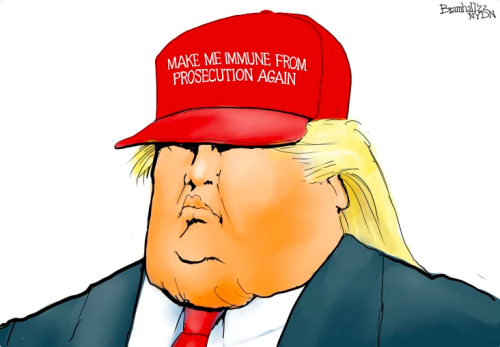The other big news today is that Schumer and Manchin reached a deal on a climate and drug pricing reconciliation bill. The bill is brillinatly titled “The Inflation Reduction Act of 2022” to address Manchin’s reasons for nixing similar bills in the past, not that there was a rational reason to assume lowering drug prices and transitioning away from fossil fuels was going to fuel inflation. Negotiating with Manchin must be a bit like herding cats.
Anyway, this would be a good bill to pass. As I understand it, it provides $369 billion to transition away from fossil fuels, allows Medicare to negotiate prescription drug prices, and extends critical Affordable Care Act subsidies for three years. It also includes a 15 percent minimum corporate tax on companies of $1 billion or larger.
Of course, nobody trusts Manchin until this thing is passed, and I don’t believe anyone has heard from the Senate’s other free radical, Kyrsten Sinema (D-Rabbit Hole), yet. “While Sinema may not want to personally kill this heaven-sent deal herself, it would be surprising if she doesn’t take at least a pound of flesh in concessions to show her corporate friends she is still a major player,” Ed Kilgore writes.
This proposal also has to pass in the House, of course, where Josh Gottheimer (D-the 1 Percent) and his merry band of blue dog “centrists” are always ready to kill any part of the Democratic Party agenda, just because they can.
One interesting part of the story is that apparently the Dems put one over on Mitch McConnell. Per Josh Marshall:
While Senator Schumer and the White House were trying to revive some skinny version of the BBB and climate legislation with Joe Manchin Senator McConnell tried to scuttle those talks with a threat. He would pull GOP support from the China competition/CHIPs bill if the Democrats did not drop those negotiations. As it happened, Manchin scuttled the deal so the threat became moot. Then the CHIPs bill passed the Senate yesterday and then within like an hour – voila – the Manchin deal was back and somehow finalized. Senate Republicans were clearly pissed but the bill had already passed the Senate.
The “chips” bill has passed the House and can be signed by President Biden. It is intended to boost domestic production of semiconductor chips so that the U.S. is less reliant on other countries to keep our computers going. I take it that some House Republicans who had planned to vote for it changed their minds when the Schumer-Manchin deal was announced, but it passed anyway.
Susan Collins (R-Ozone Layer) said that the surprise announcement of the Schumer-Manchin deal could doom bipartisan efforts on a bill to protect same sex marriage. That makes no sense whatsoever to me, either. It’s like everyone in the Senate is a 12-year-old.
In other legislative news, a bill “aimed at protecting veterans exposed to toxic materials during their service was shut down yesterday in the Senate, in a 55 to 42 vote that failed to meet the 60-vote threshold necessary to advance the legislation.” Here is a list of the Republicans who voted against it. Chuck Schumer’s was the only Democratic vote against it, and I understand he cast that vote as part of a procedural maneuver that might allow reviving it at some other time.



